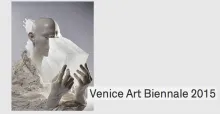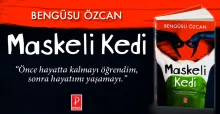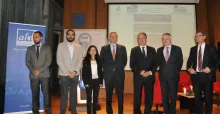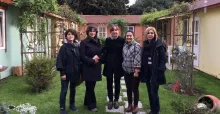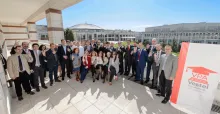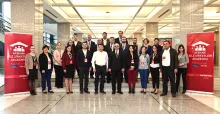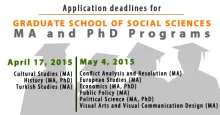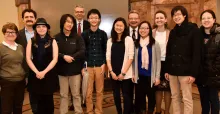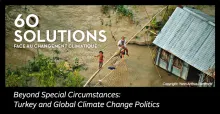SABANCI UNIVERSITY
GRADUATE SCHOOL OF SOCIAL SCIENCES
GRADUATE PROGRAMS
2015 – 2016 FALL APPLICATIONS
The following programs leading to MA and PhD degrees are accepting applications for 2015-2016 academic year Fall semester.
Contact names for each program have been provided for academic inquiries only. For administrative or procedure related questions, please contact Student Resources Office.
Conflict Analysis and Resolution (MA) www
Contact: Emre Hatipoğlu, (216) 483 92 60, ehatipoglu@sabanciuniv.edu
Cultural Studies (MA) www
Contact: Sibel Irzık, (216) 483 93 32, sibeli@sabanciuniv.edu
Economics (MA/PhD) www
Contact: Özgür Kıbrıs, (216) 483 92 67, ozgur@sabanciuniv.edu
European Studies (MA) www
Contact(s): Meltem Müftüler Baç, (216) 483 92 47, muftuler@sabanciuniv.edu
History (MA/PhD) www
Contact: Halil Berktay, (216) 483 92 37, hberktay@sabanciuniv.edu
Public Policy (MA) www
Contact: Abdurrahman Aydemir, (216) 483 93 44, aaydemir@sabanciuniv.edu
Political Science (MA/PhD) www
Contact: Ersin Kalaycıoğlu, (216) 483 93 45, kalaycie@sabanciuniv.edu
Turkish Studies (MA) www
Contact: Halil Berktay, (216) 483 92 37, hberktay@sabanciuniv.edu
Visual Arts and Visual Communication Design (MA) www
Contact: Onur Yazıcıgil, (216) 483 93 34, oyazicigil@sabanciuniv.edu
Applicants must have completed their previous degree programs by August 31, 2015, at latest.
Admission Requirements
Admission Requirements for Graduate School of Social Sciences
Financial Support
A limited number of scholarships based on academic achievement are available in the form of partial or full tuition waivers and/or stipends.
Click for SU Graduate Scholarships.
Click for Graduate Funding, Other Opportunities and Awards
Please note that those candidates who fail to submit a sufficient English proficiency exam score and thus attend the course of English Language Preparation will receive no scholarship until they successfully complete the course.
Deadline
April 17, 2015 is the deadline for applications to Cultural Studies, History and Turkish Studies programs.
May 4, 2015 is the deadline for applications to Conflict Analysis and Resolution, Economics, European Studies, Public Policy, Political Science and Visual Arts and Visual Communication Design programs.
For History, Political Science, Visual Arts and Visual Communication Design programs, all applicants should attend and take the written exam, afterwards eligible candidates are invited for an interview via e-mail. For other programs, after an initial screening, eligible candidates are invited for an interview via e-mail.
Please note that applications from abroad will not be required to take the written exam; they will be interviewed via phone or net meeting (Skype, etc.) if they’re found eligible after the initial screening.
The Graduate Admissions Calendar
Economics (MA/PhD)
Interview** : May 18, 2015 (FASS 2056) at 9:00
European Studies (MA)
Interview** : May 21, 2015 (FASS 2056) at 9:00
Cultural Studies (MA)
Interview** : May 6-7, 2015 (FASS 2056) at 9:00
Conflict Analysis and Resolution (MA)
Interview**: May 14, 2015 (FASS 2056) at 9:00
History (MA/PhD)
Written Exam* : May 4, 2015 (FASS 1008A / 2034) at 9:30
Interview** : May 6-7, 2015 (FASS 2054) at 9:30
Public Policy (MA)
Interview**: May 13, 2015 (FASS 2054) at 9:00
Political Science (MA/PhD)
MA Written Exam / PhD Gateway Exam * : May 11, 2015 (FASS 1103) at 10:00
Interview** : May 14-15, 2015 (FASS 2054) at 10:00
Turkish Studies (MA)
Interview** : May 5-6, 2015 (FASS 2054) at 9:30
Visual Arts and Visual Communication Design (MA)
Written Exam*: May 18, 2015 (FENS L048) at 10:00
Interview** : May 20, 2015 (FASS 2056) at 10:00
*All candidates are required to attend the admission exam / interview at the given date.
Applicants for more than one program must get in touch with the contact names of those programs and petition to take the entrance exams in a different time period to avoid possible time conflicts.
**Eligible candidates are going to be invited via e-mail for the interview.
Applications:
Online applications are accepted via http://admission.sabanciuniv.edu/ . Application documents (official exam results, transcript, etc..) should be uploaded on the online system and application packages be submitted either in person or post by mail to the address below. Please note that print-out of the completed application form should also be added to the application package. The packages sent via mail must arrive at the department by the application deadline. Applications sent via e-mail are not accepted.
Warning! All the application documents become property of Sabancı University. It is suggested to keep the original reports of TOEFL, GRE and ALES scores, and apply with the copies of those test scores. But please note that the originals must be produced at the time of registration to Sabancı University.
Student Resources Office
Sabancı University, Orhanlı
34956, Tuzla/ İstanbul-Turkey
www.sabanciuniv.edu
Phone: +90 (216) 483 9093
Facsimile: +90 (216) 483 90 73
E-mail: studentinfo@sabanciuniv.edu


